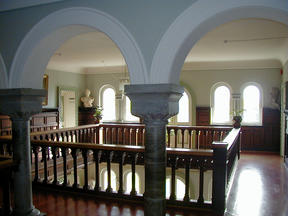About the Fridtjof Nansen Institute

The Fridtjof Nansen Institute (FNI) is an independent foundation engaged in research on international environmental, energy and resource management politics and law.
Within this framework the institute's research is mainly grouped around seven focal points:
- Global environmental governance and law
- Climate change
- Law of the Sea and marine affairs
- Biodiversity and genetic resources
- Polar and Russian politics
- European energy and environment
- Chinese energy and environment
The overall objective of FNI is to understand the underlying forces in international environmental and resource politics, and on that basis make well-founded contributions to political solutions of problems in these areas.
The institute also works to promote greater awareness of how Norway is influenced by, and may exert influence on, international framework conditions in these areas.
The main disciplines at FNI are political science and international law, but FNI researchers also hold degrees in economics, sociology, social anthropology and development studies, and have special language and regional competence on Russia and China.
FNI currently has a staff of around 50, including around 40 researchers and 3-6 students.
FNI's activities include academic studies, contract research, investigations and evaluations.
FNI's sources of funding include the Research Council of Norway, various Norwegian public bodies, business associations and private companies, the European Commission and international research foundations. Annual turnover is around 40 million NOK.
FNI collaborates extensively with other research institutions and individual researchers, in Norway and abroad. It strives to make its expertise available and relevant to users as well as to the public at large. FNI research is published in international scholarly journals and books. The institute also has its own report series.
 FNI is the research arm of The Fridtjof Nansen Foundation at Polhøgda, established in 1958 to conduct research within the interest areas of Fridtjof Nansen and to maintain the property of Polhøgda, Nansen's home. The Foundation is governed by a six-member Board, elected by a Council. The Board appoints the Institute Director for periods of four years.
FNI is the research arm of The Fridtjof Nansen Foundation at Polhøgda, established in 1958 to conduct research within the interest areas of Fridtjof Nansen and to maintain the property of Polhøgda, Nansen's home. The Foundation is governed by a six-member Board, elected by a Council. The Board appoints the Institute Director for periods of four years.
